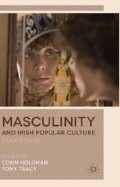Abstract
A sense of liminality, strangeness and dread permeates Patrick McCabe’s 2006 novel Winterwood, a dark tale of nightmarish beasts, fantastical doubles and disjointed scraps of memory. In Winterwood, Freud’s concept of the return of the repressed and the indestructible nature of the unconscious2 is reflected through a fractured, hallucinogenic narrative of uncanny despair, where McCabe lays bare the impact that institutional sexual abuse, in tandem with rapid social change, can have on individual subjectivity. In this chapter, I wish to argue that this novel can be framed within the gendered reading of the cultural condition of postmodernism articulated by several contemporary feminist theorists who argue that the overwhelming masculinity of Enlightenment reason, which identified femininity and homosexuality as ‘other’, previously precluded the evolving, variable identity scripts common to postmodern texts.3 Luce Irigaray, for instance, compares the masculinity of Enlightenment discourse with the ‘temperamental, incomprehensible, perturbed and capricious’4 nature of femininity; characteristics that in postmodernism are frequently bestowed on the masculine subject. Stripped of his clearly defined place in a rapidly changing, post-feminist society, the masculine subject lacks agency and drive and reflects Deleuze and Guattari’s concept of the ‘schizo-subject’ — multiple, decentred and often ‘refusing to speak the word “I”’.5
The uncanny is that class of the frightening which leads back to what is known of old and long familiar … The strangeness is not without, but within, there is no home per se that is a safe place from strangers, since home is the site of the uncanny, the double … sleep, madness, dreams, beasts, sex.1
Access this chapter
Tax calculation will be finalised at checkout
Purchases are for personal use only
Preview
Unable to display preview. Download preview PDF.
Notes
Sigmund Freud, The Interpretation of Dreams, trans. James Strachey (London: Penguin, 1919; 1991 edition), 217.
Luce Irigaray, This Sex Which Is Not One (New York: Cornell University Press, 1985), 103.
Nik Farrell Fox, The New Sartre: Explorations in Postmodernism (Bath: Bath Press, 2003), 30.
Patrick McCabe, Winterwood (London: Bloomsbury, 2006). Further page references to Winterwood in this chapter will be made in parentheses in the body of the text.
Homi Bhabha, The Location of Culture (London: Routledge, 1994), 200.
François Lyotard quoted in Thomas Docherty, Postmodernism: a Reader (Hemel Hempstead: Harvester Wheatsheaf, 1992), 46.
Ross Poole, ‘National identity and citizenship’, in Linda Martin Alcoff and Eduardo Medieta (eds), Identities. Race, Class, Gender and Nationality (Oxford: Blackwell Publishing, 2003), 271–80 (275).
Thomas Bartlett, Ireland: a History (Cambridge: Cambridge University Press, 2010), 536.
Kenneth Singer, ‘Group work with men who experienced incest in childhood’, American Journal of Orthopsychiatry 59 (3) (1989): 468–72 (469).
Linda Hutcheon, A Poetics of Postmodernism: History, Theory, Fiction (London and New York: Routledge, 1988), 289.
As suggested by Shirley Peterson. ‘Homeward bound: trauma, homesickness and rough beasts in O’Brien’s In the Woods and McCabe’s Winterwood’, New Hibernia Review 13 (4) (2009), 40–58.
Editor information
Editors and Affiliations
Copyright information
© 2014 Annabel Sheehan
About this chapter
Cite this chapter
Sheehan, A. (2014). A Postmodern Crisis of Irish Masculinity — Patrick McCabe’s Winterwood (2006). In: Holohan, C., Tracy, T. (eds) Masculinity and Irish Popular Culture. Palgrave Macmillan, London. https://doi.org/10.1057/9781137300249_8
Download citation
DOI: https://doi.org/10.1057/9781137300249_8
Publisher Name: Palgrave Macmillan, London
Print ISBN: 978-1-349-45307-8
Online ISBN: 978-1-137-30024-9
eBook Packages: Palgrave Media & Culture CollectionLiterature, Cultural and Media Studies (R0)

